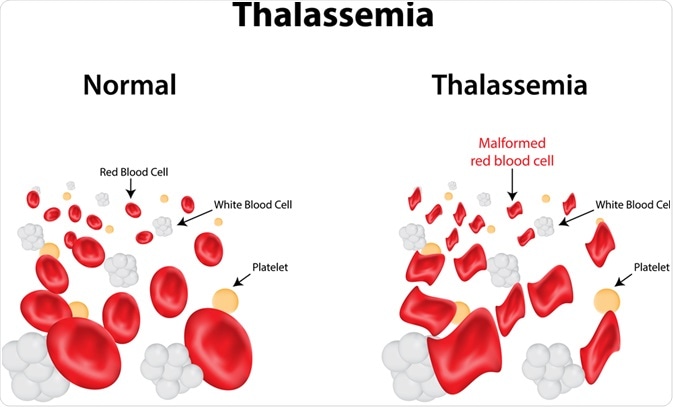Thalassemia is a genetic blood disorder that is associated with a reduction in hemoglobin in red blood cells (RBCs) and, subsequently, insufficient oxygen reaching cells in the body.

Image Credit: joshya / Shutterstock.com
However, individuals with this condition may actually be at an advantage when it comes to certain diseases, such as malaria, as it may offer a protective effect.
Protection from malaria
Malaria is a potentially lethal condition that is common in areas with a tropical or subtropical climate, where the prevalence of thalassemia is similarly high.
Some research has suggested that people with thalassemia are less likely to suffer from malaria due to a protective effect of the condition. It appears that smaller quantities of hemoglobin in more cells, which is a distinctive characteristic of thalassemia, may offer an advantage against malaria.
According to the research, children with mild alpha-thalassemia have natural protection against the anemia associated with malaria. The study was conducted in Papua New Guinea and included 800 children as participants in the study. In this region, malaria is endemic and a high percentage of children also have alpha-thalassemia.
For severe cases of malaria, an individual can lose 30-50% of total RBCs and lead to anemia in the blood. However, children with alpha-thalassemia tended to recover more easily after experiencing a malaria attack.
Although the reason for this is not certain, it is thought to occur as a result of the increased number of red blood cells present in children with thalassemia. They typically possess 10-20% more RBCs as compared to individuals without thalassemia and, thus, a reduction in the number is less likely to cause serious damage.
This unusual benefit of thalassemia is a simple consequence of the body’s response to the reduction in hemoglobin in the blood. Their body produces more cells to compensate, which then offers a protective effect against another disease that is also prevalent in the same region.
Given the significant impact of malaria, particularly on the global mortality of children, this benefit of thalassemia is notable. Up to two million deaths occur every year in Africa and Asia due to malaria and, in many of these regions, genetic mutations have risen, offering a form of protection.
The potentially beneficial effect of other types of thalassemia, such as beta-thalassemia, has not yet been established. However, it is possible that there are similar protective effects against malaria in other types of thalassemia.
References
Further Reading
Last Updated: Mar 30, 2021